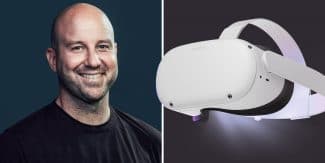Facebook won’t release an Oculus Quest Pro in 2021 and Quest 2 is expected to be in market and selling to buyers “for a long while,” according to the company’s head of virtual reality.
Two of Facebook’s most vocal leaders in virtual reality, Vice President Andrew Bosworth and Consulting Technical Officer John Carmack, took part in a question and answer session on Twitter on Friday, April 16, after soliciting questions from Twitter users. Their conversation covered a number of topics and we’ll digest them all for a round up live discussion on our YouTube channel on Monday, so be sure to subscribe to UploadVR and turn notifications on for an alert when that conversation is underway.
For now, though, we’ve transcribed one of the most interesting segments of the conversation wherein Bosworth indicated the market for the original standalone Oculus Quest that was released in 2019 represents somewhere north of 1 million-plus headsets. That market size, of course, pales in comparison to the uptake of Facebook’s $299 follow-up — Quest 2 — which is lighter, more powerful and less expensive than its predecessor. Yesterday, Resident Evil 4 was announced as the first exclusive to Quest 2. Bosworth also teased the prospect of a forthcoming Quest Pro in another question and answer session earlier this year.
So what exactly should developers focus on if they want to make software for Facebook’s Quest line of headsets? Should they ignore the original Quest? And should interested consumers hold out on buying a Quest 2 if Facebook is releasing new headsets so quickly? The following transcription from the discussion should provide illuminating answers to both those questions:
John Carmack: I’m supportive of Quest 2-only exclusives, but I think that if a developer is doing something to, you know, make money there’s still a pretty substantial market there in Quest 1 users…Boz can you say roughly what percentages we have, obviously Quest 2 is outselling Quest 1 and all of our other headsets, we announced, but for developers to be able to make a kind of a rational decision on how much effort they want to put into Quest 1, it is kind of important for them to know what that could mean.
Andrew Bosworth: “I expect the incentives to be for developers to support Quest 1, absolutely, and to your point, we don’t think it’s too expensive to do that, and you are unlocking, you know, 7 figures of additional users who could potentially buy your software — which is a pretty good deal when you can get it…so the formal answer is that we may eventually allow developers who have really high end apps to target Quest 2 alone, but our very strong recommendation is to support both and that’s actually what we expect to have happen based on historical norms…”
Andrew Bosworth: People are also asking about the Quest 3, which doesn’t exist yet, and everyone who is listening to us who is a reporter there isn’t a Quest 3, there’s only a Quest 2, but I did hint at an AMA earlier this year about Quest Pro because we do have a lot of things in development where we want to introduce new functionality to the headset along the kinds that people theorize that we would want to introduce, and that’s a little ways off still. It’s still not gonna happen this year. For those who are curious, Quest 2 is going to be in the market for a while – for a long while, and it’s gonna be, you know, I think the best bet for the most accessible way to get into VR and have a great experience.




